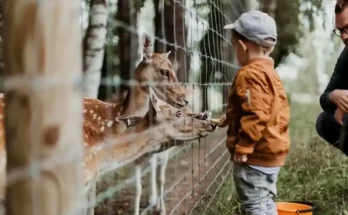In a world often filled with chaos, noise, and deadlines, there is one quiet companion that brings unconditional love, grounding energy, and unexpected joy—a pet. Whether it’s a dog bounding toward the door, a cat curled on your lap, or even a parrot greeting you with your own voice, pets have a way of turning ordinary days into something more meaningful.
But adopting a pet isn’t just about cute moments and cuddly selfies. It’s about entering into a relationship rooted in care, empathy, and commitment. It’s about choosing to take responsibility for another life and, in doing so, watching your own evolve.
Let’s explore why you should consider having a pet, which companion might suit your lifestyle best, and how this decision could change not just your daily routine, but your heart, habits, and even worldview.
Why Should You Have a Pet in Your Life?
In a society that often rewards success, appearance, and productivity, pets offer a different kind of love—unconditional and unwavering. A dog doesn’t care about your job title. A cat doesn’t mind if your house is messy. Your pet simply wants your presence, your voice, your affection.
This kind of acceptance has a powerful emotional impact. Pets don’t just keep you company—they remind you that you are enough, just as you are. That daily reminder can boost confidence, reduce anxiety, and help you feel more grounded.
Loneliness is a quiet epidemic. In the age of digital everything, real connection can be rare. A pet doesn’t replace human interaction, but it fills emotional gaps in a way that’s gentle and enduring. Coming home to a tail wag, a gentle purr, or even the rustling of a small creature in its habitat can be comforting beyond words. Pets provide a sense of presence. They make a house feel lived in and a quiet moment feels less empty. For many people, especially those living alone or navigating loss, pets become a source of healing.
Choosing the Right Pet for You:
-
The Classic Companions
Dogs are known for their loyalty, playfulness, and protective nature. They’re ideal for people who enjoy outdoor activities, consistent companionship, and the structure of daily walks and interaction. A dog often becomes a full-time partner, offering joy and sometimes even a sense of purpose.
Cats, on the other hand, are more independent but equally loving in their own unique way. They’re perfect for those who want affection without high maintenance. A cat can bring calmness, entertainment, and even unexpected moments of deep connection.
-
The Small Wonders
Not everyone has the time, space, or lifestyle for a dog or cat. Smaller pets like rabbits, hamsters, and birds offer a more manageable option, especially for those in apartments or with limited mobility. These pets may be small, but they have big personalities and unique ways of bonding with their humans.
A bird may sing along with your morning music, while a rabbit may follow you around the house like a curious shadow. These smaller companions teach patience, observation, and a different rhythm of care.
-
Exotic Friends and Fish Tanks of Tranquility
For the more adventurous, reptiles, amphibians, or fish offer a different kind of companionship—one rooted in routine, curiosity, and admiration. A well-maintained fish tank can be calming, almost meditative. Watching tropical fish swim silently is like owning a living piece of art.
Reptiles like turtles or bearded dragons might not cuddle, but they encourage you to learn, to nurture, and to appreciate a slower kind of interaction. These pets are ideal for people with allergies or those who enjoy less hands-on, but still rewarding, animal relationships.
Health and Emotional Benefits of Pet Companionship:
-
Lower Stress, Better Heart
Studies consistently show that pet owners have lower blood pressure, reduced stress levels, and better heart health. Petting an animal can decrease cortisol (the stress hormone) and increase oxytocin (the love hormone). The effect is physiological and immediate.
Even just being around a pet can calm the nervous system. It’s no surprise therapy animals are now common in hospitals, schools, and even airports. Pets offer not just companionship—but also biological healing.
-
Movement, Mindfulness, and Mental Clarity
Having a pet, especially a dog, gets you moving. Daily walks, playtime, or even cleaning a litter box ensures you’re up and active. Physical activity, even when light, is deeply connected to improved mental health and mood.
Pets also bring us into the present moment. Watching a dog sniff the grass or a cat chasing dust in a sunbeam reminds us to slow down, to notice, to be where we are. In their simplicity, animals help us rediscover our own presence.
How Pets Transform You Through Responsibility?
Taking responsibility for a pet forces you into a routine. You begin to prioritize feeding times, playtime, walks, and clean-ups. In doing so, something subtle but profound happens—you become more structured, mindful, and self-aware.
Caring for another being makes you more responsible overall. You start showing up on time. You become more patient. You learn to adapt to the unexpected. And often, in caring for your pet, you realize you’re also caring for yourself.
Pets rely on us entirely. They can’t tell us when they feel sick or sad; we must pay attention to cues and body language. This dynamic enhances empathy—the ability to sense and respond to another’s needs even without words. Children raised with pets often grow up more empathetic and socially intelligent. Adults with pets become more emotionally balanced, aware of the needs of others, and less reactive. Responsibility teaches consistency, and consistency builds character.
Conclusion:
Adopting a pet is not just about what you give—it’s also about what you gain. Yes, it’s a commitment. Yes, it takes time, patience, and resources. But the return is immeasurable. You get loyalty, joy, laughter, healing, and most importantly—a deep connection to another life.
When you choose to care for an animal, you become part of something bigger than yourself. You become a caretaker, a nurturer, and a better version of who you were before. In a world that often pulls us away from compassion, pets bring us back to it.
So whether it’s a floppy-eared puppy, a wise old cat, or a tank of gliding fish, the invitation is simple: open your heart, share your space, and let a pet teach you how beautiful responsibility can be.




